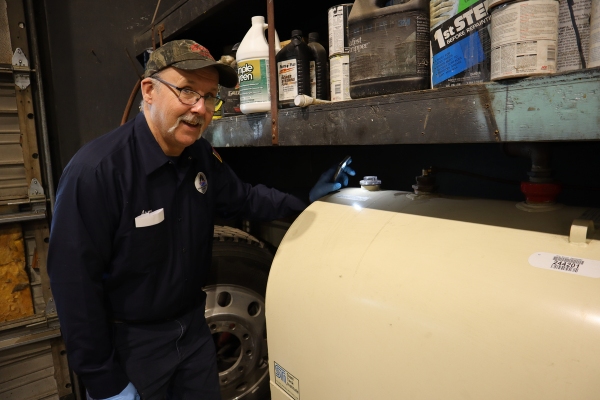Table of Contents
- The Significance of Routine Heating Oil Filter Replacements
- Advantages of Regular Heating Oil Filter Replacement
- Recommended Frequency for Changing Your Fuel Oil Filter
- Heating Oil Filter Replacements: FAQs
- Why is it Important to Monitor your Heating System After Changing the Filter?
- How Can You Tell If An Oil Filter Change Was Effective?
- Does Performing Regular Oil Filter Changes Affect Warranty Terms?
- What Steps Should Homeowners Take To Select The Appropriate Oil Filter For Their Heating System?
- What Actions Should Be Taken If Replacing The Oil Filter Fails To Improve Heating Performance?
- Conclusion
- Call Lake Region Energy for Dependable Heating Oil Delivery
Heating expenses dominate your utility bills, often consuming nearly half of your monthly energy costs—significantly more than any other household appliance. To cut back on these expenses, it’s essential to concentrate on improving heating efficiency. We’ll explore how you can enhance your system’s performance, mainly through consistent heating oil filter replacements. This article by Lake Region Energy will provide all the details to make this cost-effective change.
The Significance of Routine Heating Oil Filter Replacements

Continue to discover the vital role of oil filter changes in enhancing your heating system’s efficiency, longevity, and operational costs.
Understanding the Oil Filter
Every home utilizing fuel oil-powered appliances is equipped with a heating oil filter. This crucial component acts as a purification cartridge, filtering out contaminants from the fuel before it enters the burner. Its primary function is to prevent dirt and moisture from blocking the fuel nozzle and ensure the pump’s smooth operation. A functioning filter is essential to avoid system lockouts and damage to your equipment.
Seeking Top-Notch Heating Solutions? Choose Lake Region Energy for reliable expertise and consistent warmth throughout winter. Contact us now!
Why Regular Fuel Oil Filter Changes Are Crucial
Filters inevitably become victims of their own efficiency. Over time, as they trap increasing amounts of dirt, their surfaces become less porous, leading to a reduced oil flow rate that can ultimately cease altogether. Accumulated dirt can also break free and clog the system. It’s crucial to replace the oil filter before these issues occur.
Remember that each new filter will eventually face the same challenges, necessitating ongoing replacements as part of your heating maintenance routine. Fortunately, changing filters is a quick and straightforward task that offers numerous benefits.
Advantages of Regular Heating Oil Filter Replacement

Consistently performing the right actions can greatly enhance your system’s efficiency. Replacing your heating oil filter might seem minor, but specialists emphasize its significance for every oil boiler or furnace owner. The impact of this simple maintenance task should not be overlooked. Here are several key benefits that Lake Region Energy highlights from regular filter replacement:
Enhancing the Reliability of Your Oil-Fired Heating Equipment
For optimal performance, heating systems require a continuous flow of clean oil. A clogged or dirty filter can impede this flow, reducing the system’s effectiveness and potentially causing it to struggle to heat your home adequately.
In the worst cases, it could lead to a complete system failure, leaving your family without heat in the cold winter months. Prevent these issues by enhancing your equipment’s reliability with routine maintenance. Regularly replacing the filter ensures consistent and efficient operation.
Looking for a Heating Expert? Contact Lake Region Energy for premier service and unmatched comfort. Get in touch with our specialists today!
Sustaining Optimal Heating Efficiency
The efficiency ratings displayed on your system’s initial labels won’t maintain themselves over time. Wear and tear on components, along with the accumulation of dirt, can cause a gradual decline in performance. Inefficient heating systems require more fuel to generate the same amount of heat, contributing to higher environmental carbon emissions.
To maintain high-efficiency levels, arrange for annual professional maintenance of your system. During these visits, HVAC technicians from Lake Region Energy can conduct comprehensive tune-ups. Remember to replace the oil filter according to the manufacturer’s recommended schedule to keep your HVAC system operating at peak condition.
Extending the Lifespan of Your HVAC System

Fresh oil filters contribute significantly to maintaining the cleanliness of your home heating system. They help prevent hazardous clogs and reduce the strain on various components, enabling them to last longer. As a result, the overall lifespan of your heating system is enhanced, potentially serving as a reliable part of your home for well over a decade. By avoiding premature replacements of your HVAC system, you save thousands of dollars while continuing to enjoy optimal heating performance.
Saving Money with Efficient Heating
As we’ve highlighted, maintaining clean oil filters reduces energy consumption. This benefits the environment by cutting down on emissions and helps homeowners significantly lower their energy bills. This advantage is especially valuable during periods of economic uncertainty when fuel supplies might be tight and oil prices are rising. By ensuring your heating system operates efficiently, you can keep your heating costs under control consistently.
Is Your Heater Winter-Ready? Lake Region Energy provides expert heating services to ensure your comfort. Call us today!
Recommended Frequency for Changing Your Fuel Oil Filter

To guarantee efficient oil filtration, it’s advisable to replace your heating oil filter at least once annually, ideally before the heating season kicks off. Keep an eye on your system’s performance during the winter months. Should you notice any decrease in efficiency due to filter clogs, consider adjusting the replacement frequency to twice a year. Adding a mid-season filter change can help prevent further issues and maintain optimal system performance.
Signs It’s Time to Replace Your Heating Oil Filter
- Delayed Heating System Starts: Over time, you become familiar with how your furnace or boiler typically operates. Pay attention to unusual behaviors like delayed starts or strange noises. These could indicate your system is struggling due to a clogged oil filter.
- Dark Smoke from the Chimney: While light-colored smoke is normal, dark smoke signals trouble. This often suggests water or debris is passing through the oil filter. Reflect on the last time you replaced it—if it’s been a while, the filter may be saturated with contaminants and needs immediate replacement.
- Reduced Heating Performance: Is your home not warming up as expected? Does raising the thermostat yield little to no improvement? A dirty oil filter might be the culprit, particularly if the system shuts down unexpectedly. The blockage could be in the filter itself or a related component, both requiring attention.
Need Dependable Heating Maintenance? Lake Region Energy offers expert heating solutions designed for peak efficiency and reliability. Call us for service today!
Steps to Replace a Heating Oil Filter
- To ensure safety, always start by turning off the power to the heating system.
- Place a catch pan under the filter to collect any oil droplets that may escape during the process.
- Engage the shut-off valve on the heating oil tank to prevent oil from flowing while you work.
- Unscrew the base of the oil filter canister and remove the old filter cartridge and any gaskets.
- Before installing the new filter, clean the filter canister and the pump strainer to remove any residue or debris.
- Insert the new filter cartridge into the canister, ensuring it fits securely.
- Reattach the canister base and secure it in place.
- Reopen the supply valve to allow oil to flow back into the system.
- Loosen the air bleeder screw to release any trapped gas in the system.
- Turn the power back on and allow the oil burner to run. Observe its operation and ensure it behaves normally.
- Inspect the system thoroughly for any signs of oil leaks.
- Once confirmed that the system is running correctly, properly dispose of the old filter according to local regulations.
Tips To Use When Replacing Your Heating Oil Filter

- When replacing a heating oil filter, it’s important to protect yourself, as oil is a skin irritant. Always wear gloves to shield your hands and arms, and consider wearing an apron or similar protective clothing to prevent oil stains on your fabric.
- Handle the filter canister carefully, supporting it securely with your hand to avoid accidental drops that could damage the pipes.
- During the process, keep track of small but crucial components like rings and washers, which are easy to misplace but essential for the assembly.
- After replacing the filter, remain vigilant for leaks, which may not appear immediately. Sometimes, it can take up to 48 hours for leaks to become evident.
- Given the messy and potentially hazardous nature of oil filter replacement, if you feel unsure about performing this task, hire a professional to ensure it’s done safely and correctly.
Looking for Expert Heating Services? Lake Region Energy is your reliable source for all heating solutions, providing comfort and safety. Reach out to us today!
Heating Oil Filter Replacements: FAQs

Why is it Important to Monitor your Heating System After Changing the Filter?
It’s crucial to keep an eye on your heating system after installing a new filter to identify any decline in performance or unexpected issues quickly. Early detection of problems can prompt timely interventions, helping maintain consistent and efficient system operation.
How Can You Tell If An Oil Filter Change Was Effective?
An effective oil filter change can be identified by better heating performance, no new or unusual noises, no leaks, and the system’s ability to reach and maintain set temperatures more efficiently.
Does Performing Regular Oil Filter Changes Affect Warranty Terms?
Yes, consistent maintenance, such as changing oil filters, is commonly required under many HVAC system warranties. Ignoring these maintenance requirements can invalidate your warranty, emphasizing the need for regular system care.
Looking for Professional Heating Services? Lake Region Energy provides expert precision and top-notch professionalism in all heating solutions. Contact us today for outstanding service!
What Steps Should Homeowners Take To Select The Appropriate Oil Filter For Their Heating System?
Homeowners should adhere to the manufacturer’s guidelines for their heating system to determine the correct filter specifications. Alternatively, consulting with a professional HVAC technician can ensure the correct filter type and size is chosen, which is vital for maintaining system efficiency.
What Actions Should Be Taken If Replacing The Oil Filter Fails To Improve Heating Performance?
If heating issues persist even after a filter replacement, this might suggest more complex problems within the system. It is wise to arrange for a thorough diagnostic evaluation by a certified HVAC technician to pinpoint and resolve any underlying issues.
Conclusion
Oil filters are crucial in keeping furnaces free from clogs, allowing the heating system to operate smoothly. However, their effectiveness is temporary, necessitating regular heating oil filter replacements to uphold efficiency, reliability, and overall performance. It’s important to change these filters frequently. If you find the task daunting, don’t hesitate to call a professional for help to ensure a hassle-free replacement.
Enhance Your Home’s Comfort with Lake Region Energy – Reach out today for expert heating services that boost your home’s warmth and efficiency. Call us now!
Call Lake Region Energy for Dependable Heating Oil Delivery
Lake Region Energy ensures homes and businesses in Maine and New Hampshire stay warm and comfortable with prompt and reliable heating oil delivery. Our dedication to providing top-quality fuel and efficient service means you can count on us for seamless comfort at competitive prices.
In addition to heating oil delivery, Lake Region Energy offers a full range of HVAC services, making us your one-stop solution for home comfort. Whether you need system installations, routine maintenance, or emergency repairs, we deliver exceptional care for all your heating and cooling needs.
Choosing Lake Region Energy means partnering with a trusted provider committed to outstanding service and customer satisfaction. Renowned for our reliability, we invite you to begin with a free consultation. Contact us today to learn more!
For more information about our fuel deliveries and HVAC services, be sure to contact Lake Region Energy. You can click here to contact us, or you can call us at (207) 839-5500 to find out more. We offer a full line of heating and cooling repairs, maintenance services, and installations. Click the link to view our service area.

Related Articles:
- AFUE Ratings Explained: What Homeowners Need To Know
- Essential Winter Maintenance Checklist for Homeowners
- Essential Tips For Selecting A Dependable Fuel Oil Provider
- Why Did My Furnace Stop Working: The Usual Components To Break Down
- Carbon Monoxide Safety: Essential Tips for a Safe Heating Season
- Avoid Heating System Failures With Proper Oil Burner Maintenance
